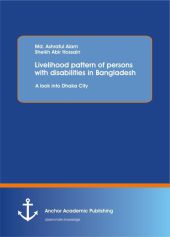 Neuerscheinungen 2016Stand: 2020-02-01 |
Schnellsuche
ISBN/Stichwort/Autor
|
Herderstraße 10
10625 Berlin
Tel.: 030 315 714 16
Fax 030 315 714 14
info@buchspektrum.de |

Md. Ashraful Alam, Sheikh Abir Hossain
(Beteiligte)
Livelihood pattern of persons with disabilities in Bangladesh. A look into Dhaka City
2016. 164 S. 58 Abb. 220 mm
Verlag/Jahr: ANCHOR ACADEMIC PUBLISHING 2016
ISBN: 3-9548948-2-3 (3954894823)
Neue ISBN: 978-3-9548948-2-6 (9783954894826)
Preis und Lieferzeit: Bitte klicken
Bangladesh is one of the most poverty stricken developing countries in south-east Asia. The country faces immense problems of persons with disabilities, but the main problems are not yet prioritized. According to the World Bank estimates, about 15% of the population in Bangladesh consists of persons with disabilities and the number is increasing day by day. It is evident that persons with disabilities are more likely to experience economic and social disadvantages than those without disability in Bangladesh. This book illustrates the livelihood pattern of those persons with disabilities living in Dhaka City.
´Text sample:
Chapter 3.4: Condition of the PWDs in Bangladesh:
In Bangladesh, the number of people with disability is fifteen to twenty million, and the number is increasing day by day. Recurrent incidents of road accident and factory fire are making the situation worse(The Daily Star, April 23, 2013). According to the World Disability Report, published by the World Health Organization and the World Bank, in 2011, it is estimated that around twenty million people in Bangladesh are living with a disability. It is evident that persons with disabilities are more likely to experience economic and social disadvantages than those without disability. There are many reasons for this, ranging from the limitations that arise from physical and mental impairment to the disabling impact of discrimination and a wide array of other societal barriers.
Estimates vary, but according to the Centre for Disability in Development, a local NGO, approximately 16 million people with disabilities live in Bangladesh today. Disability and poverty are often mutually reinforcing. Many disability rights groups - both local and international - say that people with disabilities are overrepresented among those living in absolute poverty, by one WB estimate accounting for 1 in 5 of the poorest people.
In Bangladesh, the access and opportunity for both technical and vocational training are limited. One of the effective ways of enabling persons with disabilities for livelihoods is to improve their access to informal training that is locally-based and create more access to microfinance institutes to engage them in self-employment. The Government had declared quota for persons with disabilities along with the orphans in selected grades of Government jobs. The 10% quota is not applicable for the entire government sector. It is mentioned there that the 10% quota is for persons with disability and orphan. And it is applicable for the 3rd and 4th class jobs only. Lately in 2002, there was an announcement that disabled will get 1% job at the 1st and 2nd class jobs. And the 1% is according to the ratio of reserve quota (54%-56%) not from the 100%. But this was not adequately practiced in majority of the recruitments. Negative attitude towards the abilities of persons with disabilities, inaccessible workplace and rigidity in policy created obstacles in waged employment including government sector.
In our country, persons with disabilities get chance only when able people are not some how available. CRP made employment for 400 girls at garment sector. There are more opportunities but coordination of the job opportunities and the contract process with a garment is a real complex. None of the ministries is giving definite budget for the persons with disabilities whether it is education or health or some other.
People with disability, generally, have minimum information about their rights and entitlement, especially in the rural areas. Once they are organized and get access to trainings offered by government and NGOs they can share information with each other. It also helps increase their self-esteem and confidence. They feel that it is possible to be self-dependent. Still our access to bank loans is limited. We get assistance from non-government banks, MFIs, microcredit organizations to facilitate capital for the trained and persons with disabilities.
When there was a demand for law ensuring easy access to bank loans for the people with disability, the banking division advised against it. We need to do advocacy with our policy makers to get access to finance from MFIs and Banks for persons with disabilities. The Ministry of Social Welfare, Department of Women Affairs, Department of Youth Development, SME foundations are implementing related programs but we are unable to use these facilities in an efficient manner. In general, trained and employed people with disability are pla


